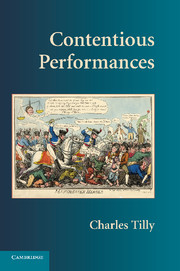Book contents
- Frontmatter
- Contents
- Boxes, Figures, and Tables
- Preface
- Contentious Performances
- 1 CLAIMS AS PERFORMANCES
- 2 HOW TO DETECT AND DESCRIBE PERFORMANCES AND REPERTOIRES
- 3 HOW PERFORMANCES FORM, CHANGE, AND DISAPPEAR
- 4 FROM CAMPAIGN TO CAMPAIGN
- 5 INVENTION OF THE SOCIAL MOVEMENT
- 6 REPERTOIRES AND REGIMES
- 7 CONTENTION IN SPACE AND TIME
- 8 CONCLUSIONS
- References
- Index
4 - FROM CAMPAIGN TO CAMPAIGN
Published online by Cambridge University Press: 05 June 2012
- Frontmatter
- Contents
- Boxes, Figures, and Tables
- Preface
- Contentious Performances
- 1 CLAIMS AS PERFORMANCES
- 2 HOW TO DETECT AND DESCRIBE PERFORMANCES AND REPERTOIRES
- 3 HOW PERFORMANCES FORM, CHANGE, AND DISAPPEAR
- 4 FROM CAMPAIGN TO CAMPAIGN
- 5 INVENTION OF THE SOCIAL MOVEMENT
- 6 REPERTOIRES AND REGIMES
- 7 CONTENTION IN SPACE AND TIME
- 8 CONCLUSIONS
- References
- Index
Summary
In his panorama of Mexican popular collective action between 1968 and the 1990s, Sergio Tamayo shows how one national campaign shaped the next. The transformation of popular contention, he concludes,
was a cumulative process of citizens' actions that during the first five years of the 1990s reached a level of extensive participation, using every sort of resource, as much legal and formal as informal and violent … As for Mexico City, the citizenry appeared with great strength, certainly a result of the city's special character as capital of the republic and urban center where regardless of its origin the national political debate concentrated.
(Tamayo 1999: 353)That “continuous process” produced a mutation, Tamayo tells us, from a turbulent 1968 in which students and workers alike agitated for various forms of socialism to a wide range of demands for citizen power during the 1990s. To some extent, violent visions of class confrontation gave way to democratic debate.
Tamayo sees five elements that transformed Mexican popular politics: 1) the Zapatista rising of 1994 and thereafter signaled a new phase of action at the national scale, 2) demonstrations, strikes, and union filing of complaints justifying strikes (aplazamientos a huelga) multiplied as vehicles of popular voice, 3) the contested elections of 1988 and 1994 weakened the hegemonic party, PRI, 4) civil society grew larger, more vocal, and more fragmented, and 5) old forms of participation – “performances” in this book's terms – used by the local citizens' committees of 1988 gave way to the national and international actions pioneered by the Zapatistas: “We can add that precisely because of the way that the [elections of 1988] ended, a cycle of participation and social movement development could close in Mexico, and with the Zapatista movement a new cycle could open” (Tamayo 1999: 355).
- Type
- Chapter
- Information
- Contentious Performances , pp. 88 - 115Publisher: Cambridge University PressPrint publication year: 2008

